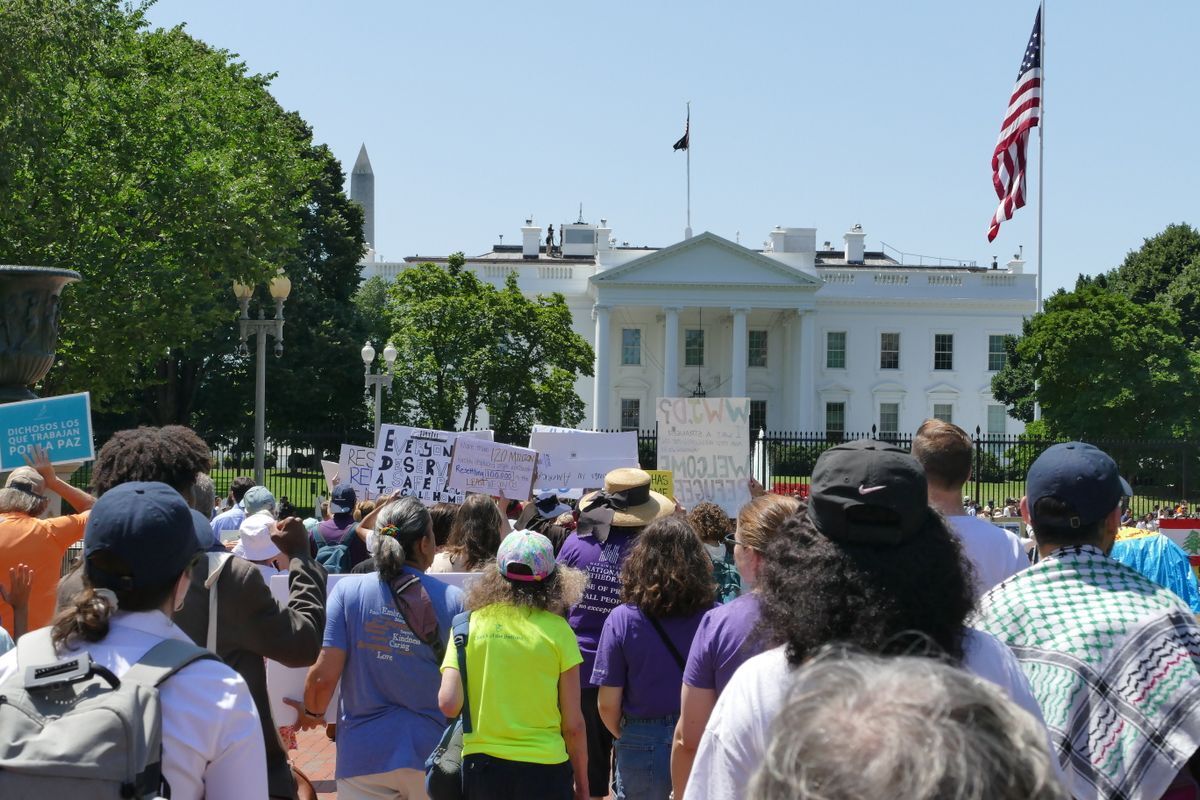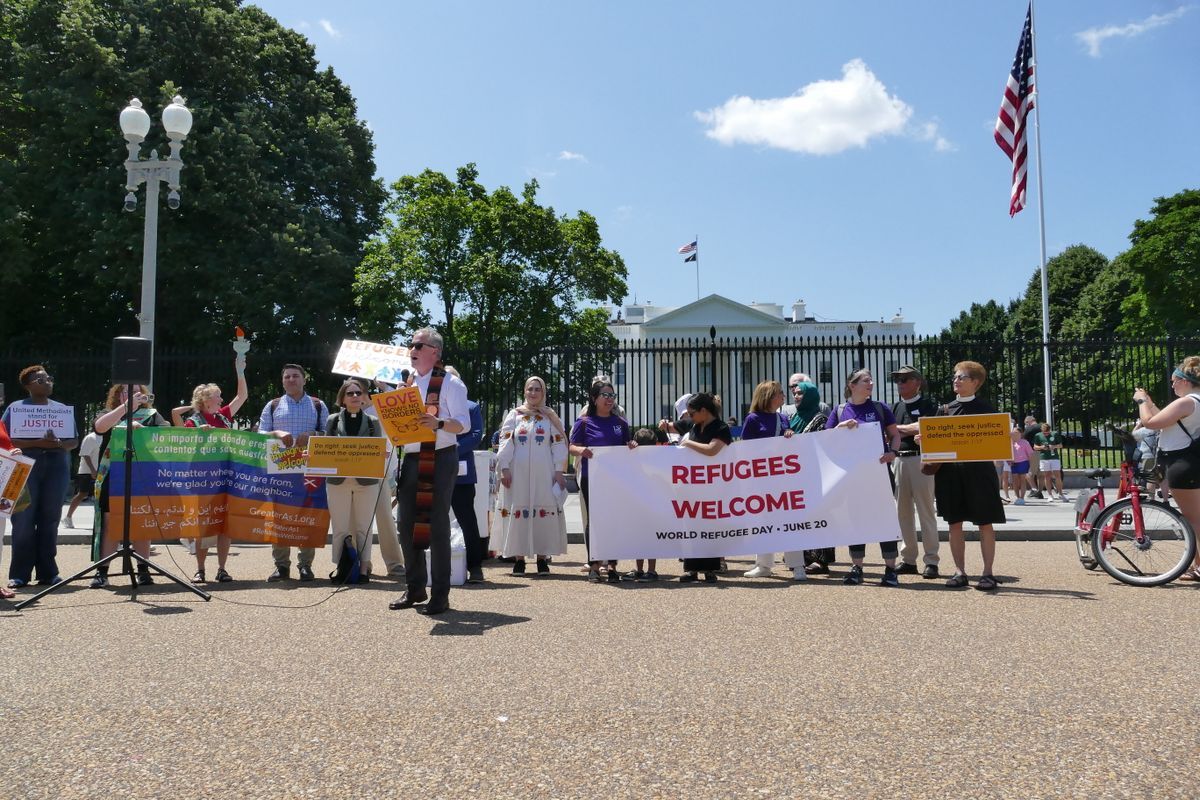Advocate for our Neighbors
Join us in advancing humane policies and programs for our community.
Policy Changes Impacting Refugees, Asylum Seekers, and Individuals from 19 Countries
In November and December, the administration issued a series of directives targeting refugees, asylum seekers, Afghan allies, and individuals from 19 countries. As a result, the administration has:
- Ordered a review of nearly a quarter of a million refugee cases for individuals resettled in the United States between January 20, 2021, and February 20, 2025.
- Halted all visa issuance for Afghan nationals indefinitely - including Special Immigrant Visa (SIV) holders.
- Suspended all asylum application decisions before USCIS.
- Halted making decisions on all immigration applications benefits for individuals from 19 countries, including Afghanistan.
Take Action: Join our partners at Church World Service to contact your elected representatives and call on them to speak out against these harmful policies and ongoing attacks on immigrant communities.
Ensure Unaccompanied Children Have the Right to Seek Safety
On Friday, October 3, multiple media outlets reported that the Department of Homeland Security would offer thousands of dollars to unaccompanied children to relinquish their right to safety and “voluntarily” leave the United States.
LSSNCA condemns this coercive and morally indefensible tactic.
Take Action: Join our partners at Church World Service to urge your elected officials to condemn DHS’s plan to incentivize unaccompanied children’s departure.
Urge Elected Leaders to Defend Refugees and the U.S. Resettlement Program
On Friday, October 31, the administration published the Presidential Determination, setting the refugee admissions at 7,500 refugees for Fiscal Year 2026 – without the legally required consultation with Congress.
Lutheran Social Services of the National Capital Area (LSSNCA) condemns this decision, which fails to meet global humanitarian needs or uphold our nation’s historic leadership.
LSSNCA urges elected officials and community members to ensure our nation’s moral and legal obligation to serve as a beacon of hope for people seeking safety.
Take Action: Join us and our partners at Refugee Council USA to urge congressional, state, and local elected leaders to defend refugees and the U.S. resettlement program.
Support the U.S. Refugee Admissions Program
On January 20, President Trump signed a sweeping series of executive orders that undermine our nation's legacy of welcome, going further than his administration did during its first term. As a result, the U.S. Refugee Admissions Program (USRAP) was largely suspended.
Impacted individuals and resettlement agencies filed a lawsuit (Pacito v. Trump) challenging this executive order. Currently, the government has begun processing 160 refugees whose travel arrangements were booked in late January and early February. However, thousands of refugees approved for travel at the time of the executive order now must undergo a case-by-case review.
As this case proceeds in the courts, it is critical that members of Congress publicly support refugees and USRAP.
Call your Members of Congress, TODAY
Instructions:
• Call the Congressional Switchboard: (202) 224-3121
• Ask to be connected to your senator's or representative's office.
• Use the Call Script below.
• Call two more times to ensure you reach both senators and House representative.
Call Script:
"Hello, my name is [insert name] from [City/Town]. As a constituent, I urge you to speak out against the administration's actions that ban refugee resettlement and end essential programs that support refugees in our communities. I encourage you to support solutions that uphold decades of precedence for welcoming newcomers. A growing majority of Americans support welcoming refugees, which has been supported on a bipartisan basis for decades. Refugees are legal immigrants, bringing enormous economic and sociocultural benefits to the communities where they resettle; they are small business owners, tax contributors, and job creators.
[OPTIONAL: Include a personal note explaining why this is important.]
Thank you for your time."
Common Sense Legislation LSSNCA Supports
Guaranteed Refugee Admission Ceiling Enhancement (GRACE) Act
Introduced on December 18, 2025, by Senator Edward J. Markey (D-MA) and Representative Zoe Lofgren (D-CA-18) to ensure a U.S. President cannot set a Presidential Determination on Refugee Admissions—the annual refugee admissions goal—below 125,000 refugees.
H.R. 4995: Enduring Welcome Act of 2025
Introduced on August 19, 2025, by Reps. Sydney Kamlager-Dove (D-CA-37), Mike Lawler (R-NY-17), Dina Titus (D-NV-01), and Michael McCaul (R-TX-10) to reinforce the statutory mandate for Afghan relocations by codifying the Office of the Coordinator for Afghan Relocation Efforts (CARE) and the responsibilities of the Coordinator and establishing a database of cases in the Afghan relocation pipeline. Read full bill text.
H.R. 670: Lady Liberty Act of 2025
Introduced on January 23, 2025, by Rep. Gerald Connolly (D-VA-11) to set a floor of 125,000 for the maximum number of refugees who may be admitted into the United States each fiscal year beginning in FY2027. Under current law, the President sets the annual cap on refugee admissions at the beginning of each fiscal year. Read full bill text.
Stay up to date on important issues with our newsletter, donate now to support programs, or read our full statements.


